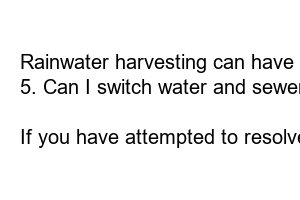상하수도 요금 조회
Water and Sewerage Bill Inquiry: A Guide to Understanding and Managing Your Utility Costs
If you have ever received your water and sewerage bill only to find yourself scratching your head in confusion, you are not alone. Understanding utility costs can be a daunting task, but fear not! In this blog post, we will break down the intricacies of water and sewerage bills, providing you with the knowledge to inquire about and manage these expenses effectively.
1. Why is my water and sewerage bill so high?
Water and sewerage bills can be influenced by various factors such as excessive water usage, leakages, or faulty meters. Additionally, seasonal fluctuations in water consumption may also contribute to higher bills. By understanding the reasons behind soaring costs, you can take appropriate measures to rectify the situation and save some money.
2. How can I inquire about my bill?
Inquiring about your water and sewerage bill is a simple process. Start by locating the company responsible for providing these services in your area and contacting their customer service department. Provide them with your account details, and they will be able to provide you with a comprehensive breakdown of your charges, including usage, fees, and any applicable taxes.
3. What can I do to reduce my water and sewerage bill?
There are several ways to lower your water and sewerage bill. Start by identifying and fixing any leaks or issues with your plumbing system. This can significantly reduce water wastage. Additionally, adopting water-saving habits such as taking shorter showers, fixing dripping faucets, and using efficient appliances can further contribute to reducing costs.
4. Is there a way to dispute an incorrect bill?
If you believe that your water and sewerage bill is incorrect, you have the right to dispute it. Start by gathering evidence to support your claim, such as meter readings or comparisons with previous bills. Contact your provider’s customer service and politely explain the situation, providing all relevant information. They will investigate the matter and make adjustments if necessary.
5. Are there any assistance programs available?
In some cases, individuals or households facing financial difficulties may be eligible for assistance programs. These programs can provide financial aid or discounts on water and sewerage bills. Contact your local social services department or utility provider to inquire about available programs and see if you qualify.
6. How often should I monitor my water consumption?
Regularly monitoring your water consumption can help you detect any unusual increases or issues. By keeping an eye on your bill and comparing it to previous months, you can identify patterns or sudden spikes that may require attention. Consider setting reminders to check your usage periodically and address any anomalies promptly.
In summary, understanding and managing your water and sewerage bill inquiry does not have to be a daunting task. By familiarizing yourself with the factors influencing your bill, inquiring when necessary, implementing water-saving measures, and monitoring your consumption, you can effectively manage your utility costs and ensure fair billing.
Frequently Asked Questions (FAQs):
1. How can I differentiate between water and sewerage charges on my bill?
Water charges typically account for the amount of water you consume, while sewerage charges are based on the amount of water that goes down the drain and into the sewage system. These charges are usually itemized separately on your bill.
2. Can I request a payment plan if I am unable to pay my water and sewerage bill in full?
Yes, many utility companies offer payment plans to customers who are unable to pay their bills in full. Contact your provider to discuss available options and make suitable arrangements.
3. What should I do if I suspect a water leak but cannot locate it?
If you suspect a water leak but cannot find its source, it is best to contact a professional plumber. They have the expertise and equipment needed to identify and fix hidden leaks, preventing further water wastage.
4. Will my water and sewerage bill be affected if I use rainwater harvesting?
Rainwater harvesting can have a positive impact on your water bill, as you will be reducing your reliance on the mains water supply. However, sewerage charges may still apply, as these are usually based on the amount of water that enters the sewage system, regardless of its source.
5. Can I switch water and sewerage providers?
In some regions, it is possible to switch water and sewerage providers. However, this may be subject to certain regulations and availability of alternative providers. Contact your local authority or regulatory body to inquire about switching options in your area.
6. What should I do if I am experiencing billing issues but my provider is unresponsive?
If you have attempted to resolve billing issues with your water and sewerage provider but have received no response, you may consider escalating the matter. Contact the regulatory body overseeing utilities in your area and explain your situation, providing any supporting documentation. They should be able to assist you in resolving the matter.

